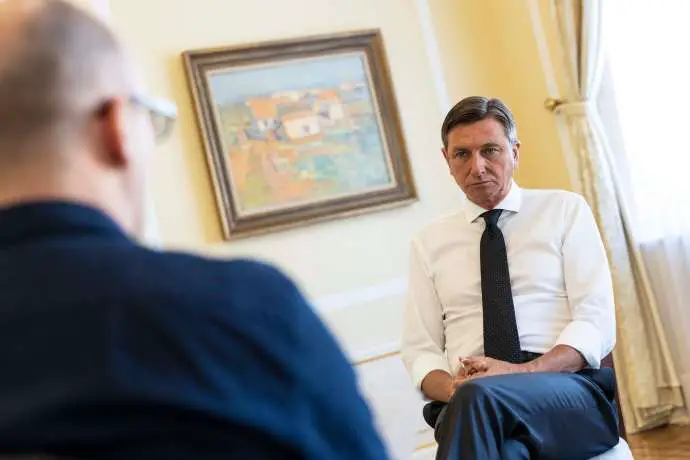STA, 17 July 2020 - President Borut Pahor discussed Monday's return of National Hall in Trieste to the Slovenian minority, and his and Italian President Sergio Mattarella's visit to two memorials in Basovizza in an interview he gave to Mladina weekly. He said Italy transferring the centre's ownership onto the minority should not be taken for granted.
After the law on the Slovenian minority was passed in 2001 setting down the return of the former commercial and cultural centre to the minority, Italy had been considering leasing it to the minority, according to Pahor.
Intervju s predsednikom republike: "Borut Pahor: »Bilo bi dobro, če bi obstajala jasnejša alternativa sedanji vladi« @SpletnaMladina https://t.co/yOqdZjyJly pic.twitter.com/U08YNntbFt
— Borut Pahor (@BorutPahor) July 17, 2020
The president said the final decision to claim ownership was taken in mid-May when he had a video call with the heads of the two Slovenian minority organisations in Italy and the Slovenian consul general and ambassador to Italy.
"We were discussing whether to risk going all the way to claim National Hall ownership, or to accommodate for some other solution, for instance merely leasing it from Italy."
He said they had decided at the videoconference to reject Italy's proposal to return the centre just to be used by the minority and to insist on its ownership.
Related: President Borut Pahor: Best of 2019 Instagram, Part 1
Only after this decision was made had a debate started on a ceremony accompanying the restitution event as well as on Pahor and Mattarela's visits to the memorials to the anti-Fascist victims and to the Italian victims of post-WWII killings, said the president.
Pahor thus rejected the notion of "quid pro quo" bargaining in that Italy would not have returned National Hall had he not visited the Foiba of Basovizza memorial.
He indicated that questions surrounding his and Mattarella's visit to the foiba memorial were hard issues, "but if I rely on my moral compass, I'm at peace".
"Both me and Italian President Mattarella felt all the way that we were doing something good."
Pahor is also aware that this gesture would not be necessarily interpreted in the same manner in Slovenia and Italy.
He was asked whether Italy should not have accompanied Pahor's visit to the foiba memorial with some other more substantive gesture, such as "giving more weight to" the 2000 report on Slovenian-Italian relations in 1880-1956 which, was compiled by historians from both countries.
Pahor said that Slovenia did expect Italy to "more attentively read the report and foremost to take it into account".
He said he did not think, based on what we know, that there are actually the remains of those killed after WWII in the Foiba of Basovizza, as they are mostly in other caves.
Il Presidente #Mattarella ?? e il Presidente della #Slovenia ?? #Pahor depongono una corona di fiori alla foiba di #Basovizza e al Monumento ai caduti Sloveni pic.twitter.com/3iDCtq2JDs
— Quirinale (@Quirinale) July 13, 2020
But he also noted that for Mattarella as a jurist, visiting the Slovenian anti-Fascists memorial, was a legal issue, since under Italian law they are still terrorists.
"If Mattarella went there, then this is a kind of an act which implies rehabilitation" of the four anti-Fascists, executed in 1930, according to Pahor.
He also said that his family had suffered under Fascism and that his grandfather had taught him that "we have to be proud, but that the other side also needs to be allowed its pride".
"Without this historical knowledge, I would not have gone that far," said Pahor in defence of his visit to the foiba memorial.
He also told Mladina that he had been raised in the anti-Fascist spirit and that he would not shy of saying he is an anti-Fascist.






